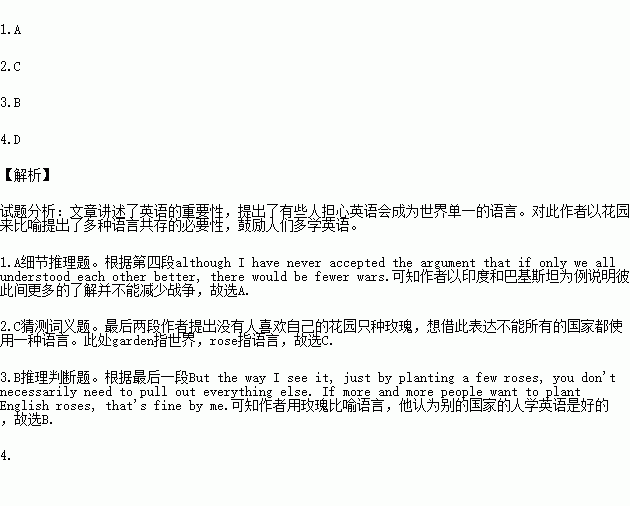题目内容
Who taught you to speak English? Your parents, while you were a young child? Your teachers at school ? Perhaps even the BBC as a grown-up. Whoever it was, somehow you have developed an understanding of what is rapidly becoming a truly global language.
There are now about 376 million people who speak English as their first language and about the same number who have learnt it besides their mother tongue. It is said there are one billion people learning English now and about 80% of the information on the Internet is in English.
Is this a good thing, or a bad thing? Should we celebrate the fact that more and more of us can communicate, using a common language, across countries and cultures? Or should we worry about the dangers of “mono-culturalism", a world in which we all speak the same language, eat the same food and listen to the same music?
Does it matter if an increasing number of people speak the same language? On the contrary (相反),I would have thought——although I have never accepted the argument that if only we all understood each other better, there would be fewer wars. Ask the people of India (where many of them speak at least some English) and Pakistan (the same situation with India)…
If we all speak English, will we then all start eating McDonald's burgers? Surely not. If English becomes more dominant (占主导地位的), it will kill other languages? I doubt it. When I travel in Africa or Asia, I am always surprised by how many people can speak not only their own language but also one or more other related languages, as well as English and perhaps some French or German as well.
When we discussed this on Talking Point a couple of years ago, we received a wonderfully poetic email from a listener in Ireland. "The English language is a beautiful language. Maybe it's like a rose," he said. "But who would ever want their garden just full of roses?"
Well, I love roses, and I think they make a beautiful addition to any garden. But the way I see it, just by planting a few roses, you don't necessarily need to pull out everything else. If more and more people want to plant English roses, that's fine by me.
1. By saying "Ask the people of India … and Pakistan" (in Paragraph 4), the author is trying to show that _____.
A. speaking the same language doesn't necessarily bring peace
B. wars can destroy the relationship between two countries
C. English doesn't kill other languages
D. English is widely used in the world
2.What does "rose" in the last two paragraphs stand for?
A. The world B. Family
C. Language D. The Earth
3.The author would probably agree that _____.
A. it's very hard to plant many kinds of flowers in a garden
B. it's good for people from other countries to learn English
C. more and more people like to plant roses in their gardens
D. English is easier to learn than other languages
4.This passage is mainly about _____.
A. why English has become a global language
B. how many people in the world speak English
C. how people in the world learn English as a foreign language
D. whether we need to worry about English being a world language

